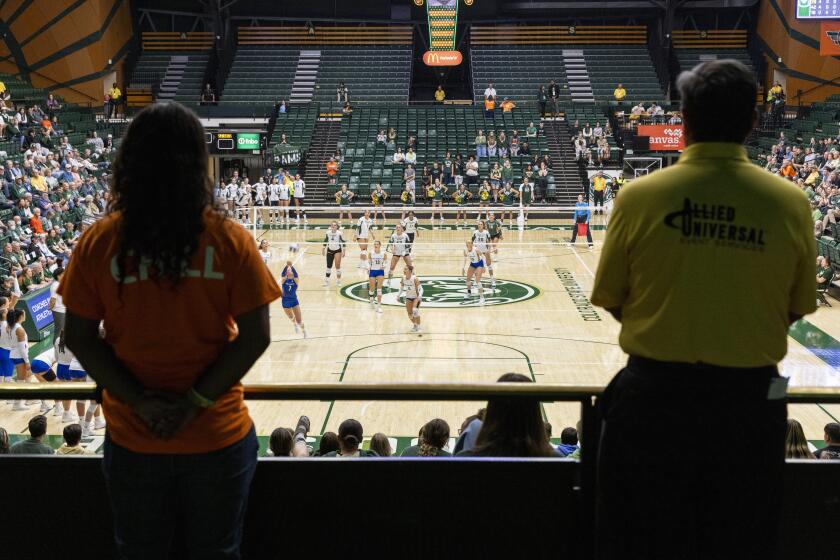New LPGA and USGA policy to ban many transgender women from competing in elite tournaments

- Share via
Hailey Davidson is a transgender women’s golfer who recently competed in the LPGA‘s qualifying series and earned a partial spot on the 2025 Epson Tour. She also came a stroke away from qualifying for the U.S. Women’s Open.
She won’t be eligible for any of those events next year.
New policies announced Wednesday by the LPGA and USGA will prohibit golfers who were assigned as male at birth and did not transition to female before starting male puberty from competing in the organizations’ elite events starting in 2025.
“Can’t say I didn’t see this coming,” Davidson wrote Wednesday on her Instagram Stories. “Banned from the Epson and the LPGA. All the silence and people wanting to stay ‘neutral’ thanks for absolutely nothing. This happened because of all your silence.”
The Colorado State women’s volleyball team was willing to play San José State, which has a transgender player, in the Mountain West Conference tournament final, and it ended the Spartans’ season.
The LPGA’s Gender Eligibility Criteria will apply to any player seeking to participate in LPGA Tour, Epson Tour, Ladies European Tour and other events. The USGA’s Competitive Fairness Gender Policy applies to the U.S. Women’s Open, the U.S. Senior Women’s Open and any other any USGA championship, including qualifiers.
In the introduction to its new policy, the LPGA wrote: “In consulting with top experts in the fields of medicine, science, sport physiology and golf performance, we have been advised that a Player’s exposure to male puberty provides physical advantages that are beneficial to golf performance compared to Players who have not had such exposure.
“The LPGA has updated our Gender Policy for Competition Eligibility to uphold the fairness and integrity of our elite competitions while providing an inclusive environment for the broader LPGA community, which remains accessible to all women for non-elite events and activities.”
The suit, filed in federal court in Los Angeles, also claims that when the girls protested what they perceived as the unfairness of the situation by wearing T-shirts that said “Save Girls’ Sports,” school officials compared it to wearing a swastika in front of a Jewish student.
The USGA also cited “scientific studies” that reached the same conclusion. Chief executive Mike Whan said in a statement that the organization has “made changes to our eligibility criteria that reflects current scientific data and strives to maintain competitive integrity. Our updated policy reflects a thoughtful and thorough process during which the USGA consulted with leading medical professionals from around the world.”
Both organizations will require athletes assigned as male at birth wishing to participate in elite women’s events to demonstrate to the satisfaction of a medical panel that they meet the requirements, including not having experienced male puberty beyond the first stage of physical changes (or, in the case of the LPGA, age 12, whichever came first) and having a testosterone level at or below the stated limit.
Prior to the latest policy, the LPGA adapted guidelines in 2010 that allowed transgender women who have undergone at least one year of hormone therapy and a gonadectomy to participate in its events. But the participation of transgender athletes in women’s sports has become a hot topic nationally, and Davidson’s recent success helped bring the issue to the forefront in golf.
Donald Trump claimed during a town hall that a spike by a transgender player “hit the girl in the head.” San Diego State says that didn’t happen.
Retired LPGA player and Independent Women’s Forum ambassador Amy Olson has been helping lead the charge for a change to the policy. She recently told Golf Monthly that she and more than 250 of her peers signed a letter to the LPGA Tour to express their concerns.
In a video posted to Instagram on Wednesday, Olson called the organizations’ decisions “a massive victory for female athletes.”
“This goes a long way to protecting fairness in women’s sports and it recognizes that our chromosomal makeup actually affects how we develop in a way that’s irreversible,” Olson said. “So thank you to the LPGA and USGA for your courage and leading on this issue and making sure that we protect these opportunities for women.”
Davidson, who turned 32 on Wednesday, did not share in Olson’s enthusiasm.
“What a great birthday present for 2024,” she wrote. “Having the greatest achievement I’ve earned in my life taken away from me.”
More to Read
Go beyond the scoreboard
Get the latest on L.A.'s teams in the daily Sports Report newsletter.
You may occasionally receive promotional content from the Los Angeles Times.












